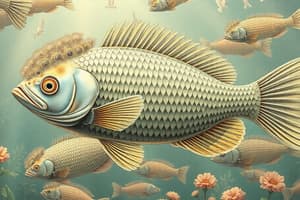Podcast
Questions and Answers
Question 1
Question 1
What are the two main factors that determine fish growth in aquaculture?
Answer 1
Answer 1
Internal (fish-related) and external (environment-related) factors.
Question 2
Question 2
What are some of the internal factors that affect fish growth in aquaculture?
Answer 2
Answer 2
Question 3
Question 3
Answer 3
Answer 3
Question 4
Question 4
Answer 4
Answer 4
Question 5
Question 5
Answer 5
Answer 5
Question 6
Question 6
Answer 6
Answer 6
Question 7
Question 7
Answer 7
Answer 7
Question 8
Question 8
Answer 8
Answer 8
Question 9
Question 9
Answer 9
Answer 9
Question 10
Question 10
Answer 10
Answer 10
Question 11
Question 11
Answer 11
Answer 11
Question 12
Question 12
Answer 12
Answer 12
Question 1
Question 1
Answer 1
Answer 1
Question 2
Question 2
Answer 2
Answer 2
Question 3
Question 3
Answer 3
Answer 3
Question 4
Question 4
Answer 4
Answer 4
Question 5
Question 5
Answer 5
Answer 5
Question 6
Question 6
Answer 6
Answer 6
Question 7
Question 7
Answer 7
Answer 7
Question 8
Question 8
Answer 8
Answer 8
Question 9
Question 9
Answer 9
Answer 9
Question 10
Question 10
Answer 10
Answer 10
Question 11
Question 11
Answer 11
Answer 11
Question 12
Question 12
Answer 12
Answer 12
Question 1
Question 1
Answer 1
Answer 1
Question 2
Question 2
Answer 2
Answer 2
Question 3
Question 3
Answer 3
Answer 3
Question 4
Question 4
Answer 4
Answer 4
Question 5
Question 5
Answer 5
Answer 5
Question 6
Question 6
Answer 6
Answer 6
Question 7
Question 7
Answer 7
Answer 7
Question 8
Question 8
Answer 8
Answer 8
Question 9
Question 9
Answer 9
Answer 9
Question 10
Question 10
Answer 10
Answer 10
Question 11
Question 11
Answer 11
Answer 11
Question 12
Question 12
Answer 12
Answer 12
Flashcards are hidden until you start studying
Study Notes
Factors Affecting Fish Growth and Performance in Aquaculture
- Growth is important in aquaculture for economic reasons.
- The main factors determining growth are internal (fish-related) and external (environment-related).
- Internal factors include species, sex, health, age, weight, body composition, and genetics.
- External factors include husbandry practices, water quality, and feed.
- Feed is a crucial external factor that affects growth and includes factors such as density, handling, feeding method, composition, formulation, and physical aspects.
- The most economically important factor is feed.
- The intensity of aquaculture systems can be described using a sigmoid growth curve.
- Growth potential is affected by internal and external factors, including nutrition and environment.
- Variability in the environment, including nutrition, can lead to compensatory growth.
- Compensatory growth occurs due to higher feed intake and efficiency.
- Seasonal variation in growth can occur in some species, such as sole.
- Factors such as nutrients, oxygen, and toxins can interact to affect growth in complex ways.
Concepts and Definitions of Growth in Aquaculture
- The ultimate goal in aquaculture is the production of operation for business and profit, which requires boosting growth and weight.
- Factors that affect growth in fish include feed conversion ratio, growth rate, survival, and quality of the end product.
- Growth in fish is influenced by internal conditions such as species, sex, health, history, genetics, and external conditions such as husbandry, water quality, and feed composition.
- Growth is defined as an increase in the size of fish over time and can be quantified in various ways such as volume, mass, length, energy, protein, fat, or dry matter.
- Under normal conditions, growth in fish is continuous, but under sub-optimal conditions, it can be discontinuous and result in compensatory growth, which is an accelerated growth rate.
- High growth rates during compensatory growth can be caused by higher feed intake, higher efficiency, lower maintenance, and changes in body composition.
- Seasonal variations in fish growth are affected by factors such as temperature and food availability.
- Crustaceans experience discontinuous growth due to molting, which is responsible for the discontinuous nature of their growth.
- The relationship between feed intake and growth in fish is affected by factors such as nutrition, animal-related factors, and environmental factors.
- A curvilinear relationship between growth and feed ration can be caused by experimental error, feed spillage, change in body composition, and individual variation in R.max.
- Factors that can affect growth performance in fish include nutrients, oxygen, toxins, NH4, CO2, temperature, pH, and stocking density.
- Other factors such as feed quality and swimming activity can also affect the relationship between feed ration and growth in fish.
Studying That Suits You
Use AI to generate personalized quizzes and flashcards to suit your learning preferences.




